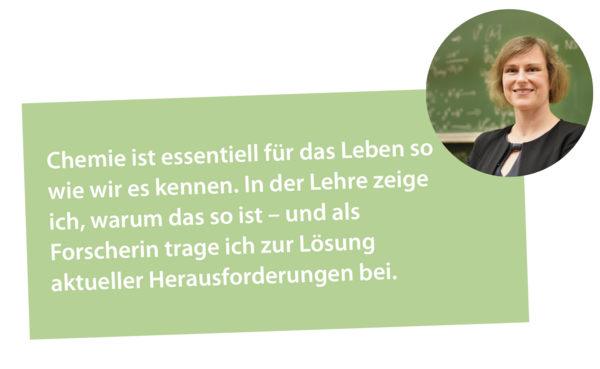


Prof. Dr. Weber enjoyed chemistry even at school. It's no surprise that she decided to study chemistry. After completing her studies, she earned her doctorate and decided to pursue an academic career. Today, she holds a professorship at the University of Bayreuth.
Already at school I liked chemistry - besides mathematics - very much, so that when I started my studies the choice between mathematics and chemistry was in favor of chemistry. The course of my studies showed that it was a very good decision, because chemistry is not a purely theoretical science and I really enjoyed working in the laboratory.
The path from studying and doing a doctorate to becoming a university professor is somewhat longer than for other professions. There are traditionally stays abroad and the habilitation in between. That took me about seven years in total. It must be said that you already work independently during your habilitation and also receive an appropriate salary, or a scholarship with me at the time. A disadvantage of this route were all the fixed-term contracts and scholarships, with which there was not much planning security. Towards the end of my habilitation, I started applying for vacancies. At the time, there were quite a few of them and I had an offer for my first permanent position, the professorship, in my hands relatively quickly.
Even at the end of my doctorate, it was clear to me that I would find the combination of research and teaching exciting and that I would like to take this path.
A university lecturer's remit spans three broad areas: research, teaching, and academic self-government.
First of all, research includes establishing your own research area. At first I couldn't really imagine where all the questions were coming from, but in fact each answered question leads to at least three new questions that can be worked on. For this purpose, applications have to be written to fund the research, alone or with colleagues. The results are then published at conferences and in writing as specialist articles.
In addition to lectures, teaching also includes the organization of internships and seminars. In self-administration you can get involved in many different bodies.
You should be happy to research, you can already find that out during your doctorate. This also includes the exchange and cooperation with others - colleagues, students, the university management. So there must be a willingness to communicate. Since not everything always works the first time, a certain tolerance for frustration and perseverance is an advantage. English is essential - research in particular takes place internationally and you won't get very far without English. Didactic skills are still beneficial for teaching. That's a lot of things, but the job is very varied.
A typical working day during the lecture period starts in the morning with a lecture. Then students or employees often come to me with questions about their studies, lectures or their research projects. The afternoons are often meetings (2-4 hours), exams (e.g. for a doctoral thesis) or a lecture by a guest in the late afternoon.
In the ?free? time in between, one usually writes reports. During the lecture-free period, the day is not so tightly timed. That leaves time to write a publication in peace. You work very closely with colleagues on many things, in committees, on joint research projects with applications and publications. It is advantageous if you understand yourself as a team and stick together. Especially during the lecture period, there are often inquiries from students that cannot be foreseen.
During the doctorate you get an insight into the research, but usually not yet into the writing of project proposals in order to finance the research. During your studies you can see how a lecture is going on and during your doctorate you are often already supervising interns - these are first glimpses into the everyday life of a university professor.
You can also try out committee work during your studies, for example by getting involved in the student council. A clear difference is that as a university professor you have much more freedom to decide what to do in research and teaching. Of course, you are also responsible for these decisions.
I am passionate about research - nobody can dictate that and you can advance topics that are important to you. This also includes working with colleagues at home and abroad. I also like to give lectures and what I particularly appreciate about my job is that it is very varied and that you can develop yourself very well. However, this is not possible with a classic 40-hour week.
Yes, the longer you are there, the more committee work there is.
As a university lecturer you have already achieved quite a lot and have a very diverse range of tasks. You can take on more administrative activities (towards the university management) or focus more on research so that the working group becomes larger or you can apply for a larger professorship.
You have to be very enthusiastic about basic research and have a lot of perseverance due to the long journey.
Note: For reasons of readability, the simultaneous use of gender-specific language forms is not used. All personal names apply to all genders.
This page has been machine translated. If you have any feedback or comments please feel free to contact us. 
last modified: 11.06.2025 08:36 H from A.Miller